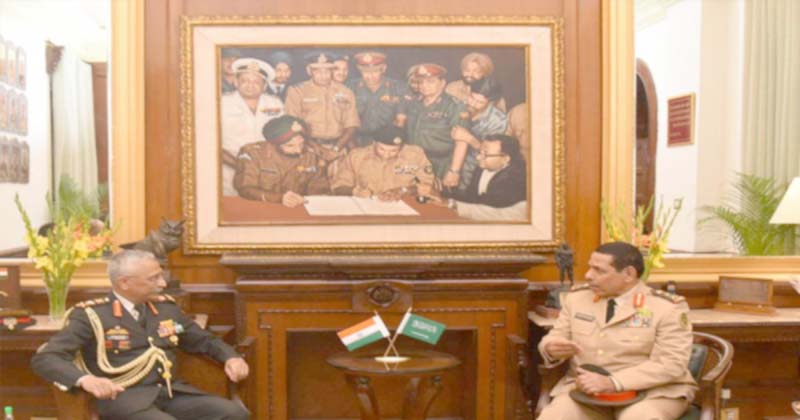Is there a hidden agenda behind this visit?
By Saleem Akhtar Malik
The Saudi Arabian army chief paid a “historic and landmark” first visit India this week, the Indian Ministry of Defence said. According to a statement issued by the Indian Ministry of Defence, Serving Commander of the Royal Saudi Land Forces, Lieutenant General Fahd Bin Abdullah Mohammed Al-Mutair arrived in India on Monday (February 14) and ended his three-day trip on Wednesday (February 16). According to a statement issued by the Indian Ministry of Defence, Commander of the Royal Saudi Land Forces, Lieutenant General Fahd Bin Abdullah Mohammed Al-Mutair was on a three-day visit to India from February 14 to February 16. This was for the first time that a serving Saudi Army Chief visited India. In what is seen as a snub to Pakistan, Saudi Army Chief did not visit Islamabad or Rawalpindi on his way back to Saudi Arabia. According to the political analysts, relations between Pakistan and Saudi Arabia have remained strained since 2015 when Pakistan’s parliament decided against military involvement in the Saudi-led coalition fighting Houthi rebels in Yemen. In its delayed response, Saudi Arabia remained indifferent to the 2019 Indian abrogation of Articles 370 and 35A of the Indian constitution ending the special status of IIOJK and trifurcating the held state into three union territories. In the recent past, Saudi Arabia and UAE have announced massive investments in the held state.
Is there something in the air?
Are the Cold War alignments being redrawn? To find an answer, we will go back to 1979. I had written earlier that 1979 was a defining year for Pakistan and its Gulf neighborhood for two reasons:1) The Islamic revolution in Iran, and 2) The Soviet invasion of Afghanistan. Let me add another reason the attack on Masjid al-Haram. On 20 November 1979, extremist insurgents calling for the overthrow of the House of Saud took over Masjid al-Haram, Islam’s holiest shrine, in Saudi Arabia. The insurgents declared that the Mehdi (the “redeemer of Islam”) had arrived in the form of one of their leaders Mohammed Abdullah al-Qahtani and called on Muslimstoobeyhim. For nearly two weeks, Saudi Special Forces, assisted by Pakistani and French commandos, fought pitched battles to reclaim the Islamic holy site. Due to historical reasons, Saudi Arabia and the city-states dotting the southern and eastern fringes of the Arabian Peninsula have always needed the US to underwrite their security. During the Cold War, Pakistan, Iran, and Turkey were the “seasonal” US allies operating under the umbrella of CENTO. After the Iranian revolution, and the emergence of a resurgent Iran, CENTO was dissolved.
However, Pakistan remains committed to the US and Saudi Arabia
The defence cooperation between KSA and Pakistan reached a new high when, in1982, a Pakistani armored brigade was stationed in Tabuk, the capital of Saudi Arabia’s Northern Province. Tabuk is located at the northern edge of the Red Sea, in the region where the boundaries of Israel, Jordan, and Saudi Arabia converge. In retrospect, it appears that the stationing of the Pakistani armored brigade at Tabuk, in 1982, was the result of the geopolitical upheavals caused in the neighborhood of Saudi Arabia, particularly by the Iranian revolution, and also due to the sense of insecurity that engulfed the Saudisin the aftermath of the seizure of the shrine of Kaaba by the Islamic mavericks. Saudis felt threatened by the fear of implosion due to an insurgency likely to be instigated by Khomeini’s Iran. The strategic cooperation between Saudi Arabia and Pakistan ceased, when, in 2015, Pakistan refused to send troops to fight Saudi Arabia’s war against Yemen’s Houthi rebels. Whereas the old relationships watered down, the US’ role as the guarantor of the Gulf States’ security has remained a constant factor in the regional dynamics. However, in the present lineup, India and Israel have replaced Pakistan, Iran, and Turkey the erstwhile CENTO allies. It goes to India’s credit that it has managed to simultaneously forge and maintain strategic relationships with the US, Gulf states, Iran, and Israel.
Israel is the new entrant in this permutation
There have been reports about secret collaboration between Israel and Saudi Arabia for years, often denied by both governments. A 2009 report said that Saudi Arabia had offered to let Israel fly over Saudi territory to attack Iran, a report denied by Israel. Saudi Arabia is wary of Hamas, and it remained notably quiet during Israel’s bombing campaign against the Hamas-controlled Gaza Strip. Another report claimed that Israel had offered its “Iron Dome” missile-defense technology to Saudi Arabia for use in the proxy war being fought in Yemen. Presently, Israeli and Indian airlines use Saudi airspace for travel between India and Israel. (Graham)* Israel and Saudi Arabia have been covertly conducting diplomacy to discuss Iran over a series of meetings since 2014. They are worried about Iran’s growing strength as a regional power. To deal with Iran, for quite some time the Israelis have been advocating: 1) peace between Israel and Arab nations,2) regime-change in Iran, and 3) creation of a new state of Greater Kurdistan including parts of Iran, Iraq, and Turkey. So, the emerging strategic alignment in the region comprises the US, India, Gulf States, and Israel. Are we surprised? A re-calibration of Pakistan’s foreign policy is clearly in order. Saleem Akhtar Malik is a Pakistan Army veteran who writes on national and international affairs, defense, military history, and military technology. He Tweets at @saleemakhtar53. The views expressed in this article are the author’s own and do not necessarily reflect the editorial policy of Global Village Space.


